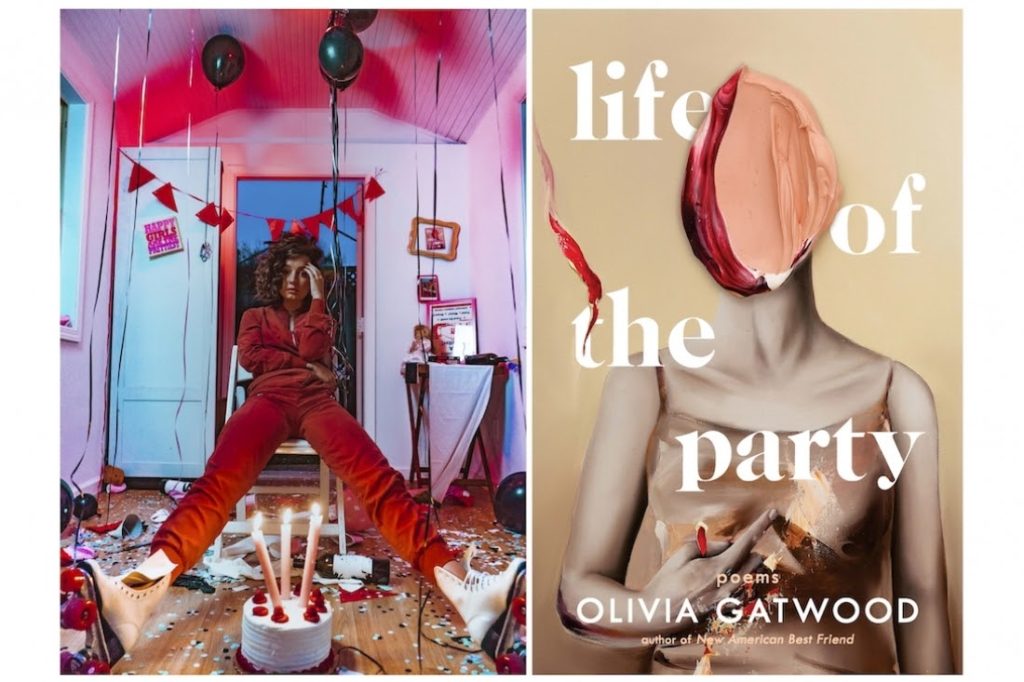Book Review: “life of the party”

Image courtesy of platform-mag.com
By Caroline Morris
From the very first line of life of the party, you’ll have to read the whole thing. It’s not a want. It’s a need.
Olivia Gatwood is a 28-year-old revelation in the literary world. Since graduating from the Pratt Institute’s fiction program in 2015, she has published two collections of poetry, New American Best Friend (2017) and life of the party (2019). Gatwood has also thrived in public performance, performing spoken word throughout the country and becoming a finalist at Brave New Voices, Women of the World, and the National Poetry Slam.
Life of the party is a book largely centered around true crime and sexual assault. Gatwood explains in the author’s note that her love of true crime stems from her too real fear as a woman of being murdered; it is a strange validation of the assault she and loved ones have experienced and the fear of its recurrence.
Gatwood also highlights the issue with true crime—that it often does not tell an honest story.
“The truth is: It is a privilege to have your body looked for. True crime… [is] a perpetuator of misogyny, racism and sexualized violence—all of which is centered around one, beloved, dead girl,” Gatwood said.
In spite of its often chilling subject matter, Gatwood also makes the collection a celebration of female sensuality and womanhood with poems such as “Ode To My Lover’s Left Hand” and “When I Say That We Are All Teen Girls.” And of course, all of Gatwood’s writing is striking in its beauty; a constant, no matter if it ultimately inspires hope or tears.
The collection features upwards of 50 poems, all of them weaving together a tapestry of lost women hoping to be found. Each poem is able to stand on its own, but the true mastery of Gatwood’s writing is best experienced when reading the poems in their collected form. The standalone tale of each poem contributes to the greater narrative at play.
Individual poems do, however, shine throughout the collection. The piece, “Ode To My Jealousy,” screams at the reader in its accusatory and vivid language.
“You plague of desert locusts born sullen in my gut,/blood-red betta eating its own tail, how I could describe/you forever as a mob, how I could learn/the name of every kind of wasp and point to you,” the poem reads.
The reader can feel the intensity of Gatwood spitting these gruesome images and hard consonant sounds out of her mouth and onto the page, mirroring the way she experiences jealousy and in turn hates such a feeling. The locusts and self-destructive bloody fish force their way into the reader’s mind in such vivid detail that the image remains long after the poem has ended.
In other moments, Gatwood’s voice is blunt and honest about the horror of the world and the purpose of her poetry.
“Maybe I am tired/of hearing people talk about the murder/of girls like it is both beautiful/and out of the ordinary,” reads the poem “My Grandmother Asks Why I Don’t Trust Men.”
Such lines almost take the wind out of the reader in their poignancy. Is it not exhausting to always be able to turn on the news and listen to the voyeuristic topic of girls being killed? Gatwood holds up a mirror to the fatigue women live through everyday that they try so hard to ignore because the truth of it feels terrifying and unchangeable.
Gatwood does not flinch from sharing her own stories of sexual abuse, recounting the many experiences in the cold and frightening resignation of a woman who has been taught that she is not allowed to say no.
“Now he wants it twice,/four times, in the middle of the night but she is asleep/but he wants it so she wakes up/until she learns to not wake up,/learns to lock herself inside of her dreams/& stay there until the sore morning,” from “A Story Ending in Breakfast.”
She does not tell just her own stories, but speaks for those who cannot. Gatwood writes poems for her childhood babysitter who was molested by her own father, serial killer and prostitute Aileen Wuornos who shot men in self-defense against rape and was executed, the black and brown women murdered in Albequerque, New Mexico, and the abuse of her own childhood friends at the hands of those they knew and loved.
Yet amongst the fear and assault and horror, Gatwood is able to sprinkle in poems that depict such sweet love that it opens up a pit of yearning and desire for such delicate intimacy. In “Ode To The Unpaid Electricity Bill,” Gatwood describes her lover in the dark of lightswitches that do not work.
“I cannot explain/that the smell of her scalp has enough electricity/to power the village of myself, her voice a reading lamp,/her stomach a power strip, each finger a thousand volts./My love, if I could tell you I would…/ There she is, surrounded by forty candles…/telling me she tried her best.”
And of course Gatwood takes time to celebrate being female, not only fighting the stigma of female desire but the shame of simply being female that the world inspires. This is best done in her poem “When I Say That We Are All Teen Girls,” likening everyone and everything to teen girls.
“Even the men who laugh their condescending laughs/when a teen girl faints at the sight of her/favorite pop star, even those men are teen girls,/the way they want so badly to be big/and important and worshipped by someone.”
Gatwood is a master at reeling her audience in with her punchy imagery and palpable emotion, and keeping them on their toes as they move from nostalgia to fear to anger to desire to hope in the space of a few pages.
Though this is a book about women, it is a book that is for everyone and should be read by everyone. After all, as Gatwood says, dead or alive, girls are always “the life of the party.”





